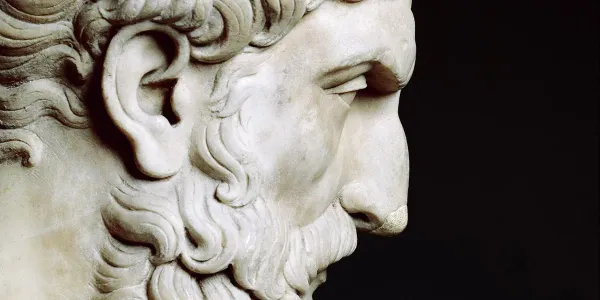
Epicurus On Why Death Should Not Concern Us
This article discusses ancient Greek philosopher Epicurus on why “death does not concern us, because as long as we exist, death is not here. And once it does come, we no longer exist.”

Ancient Greek philosopher Epicurus advocated an atomic, naturalistic view of the universe. He rejected the existence of an immaterial soul, or of anything non-physical, and said that the gods have no influence on our lives. As such, he believed being dead is not to be feared, for none of us will ever experience it.
As he puts it in a famous aphorism (from Diogenes Laertius’s celebrated survey of ancient Greek thinkers, Lives of the Eminent Philosophers, compiled in the third century CE, and also featured in Epicurus’s Principal Doctrines):
Death does not concern us, because as long as we exist, death is not here. And once it does come, we no longer exist.
From this doctrine arose the epitaph: Non fui, fui, non sum, non curo (I was not; I was; I am not; I do not care) — which is inscribed on the gravestones of Epicurus’s followers and seen on many ancient gravestones of the Roman Empire.

No consciousness means no time
To fully grasp Epicurus’s point, consider what happens when we’re unconscious. We do not experience unconsciousness — in dreamless sleep, for instance, we wake in the morning, and our most recent memory is the last thing we did at night. Though hours may have passed, we did not experience their passing: we just jumped to the next conscious episode.
So, though on the naturalistic view death is often characterized as an eternal abyss, a black silence, a terrifying nothingness, this characterization is misleading, for it suggests we’ll experience this eternal blackness. But death means the experiencing subject no longer exists. There will be no consciousness there to experience silence, darkness, or the passing of time.
The reason we struggle to imagine what this state is like is because there is nothing it is like to be in it. Consciousness is all we’ve ever known, and all we ever can know.
We learn objectively that the universe existed before we were born, and that it will continue after our deaths, but from our subjective perspectives all that’s ever existed is our consciousness. The non-existence of consciousness thus feels like an outrageous impossibility.

From the Buddha to Nietzsche: join 14,000+ subscribers enjoying my free Sunday Breakdown
In one concise email each Sunday, I break down a famous idea from philosophy. You get the distillation straight to your inbox.
💭 One short philosophical email each Sunday. Unsubscribe any time.
We struggle to comprehend our lives as a finite block of time because we live only inside the block. We characterize anything outside the block as eternal blackness or oblivion, because that’s a tempting conception of ‘nothingness’.
But, by contemplating unconsciousness and dreamless sleep, we can recognize that nothingness isn’t like that. As the Roman philosopher Lucretius also advises in his beautiful reflection on mortality, just like before we were born, in death we won’t experience anything that happens — no pleasure, no pain, no anxiety, no fear — for the conscious self simply isn’t there.
If after death our consciousness was to be magically resurrected millions of years in the future, we’d have no sense of the time that had passed. Our last conscious experience would have seemed but a moment ago. So, Epicurus advises, don’t worry about being dead: it won’t even last a millisecond.
Further reading
What do you think of this analysis? Do you think Epicurus is right in declaring death is nothing to fear? Or is the prospect of non-consciousness, of being deprived of experience and time, rightly feared?
If you’re looking to delve deeper into the teachings of Epicurus, we’ve created a short Epicureanism explainer, as well as a reading list of the best works of and about Epicureanism. Hit the banner below to access it now.

Epicureanism
The Best 5 Books to Read
About the Author

Get one mind-opening philosophical idea distilled to your inbox every Sunday (free)

From the Buddha to Nietzsche: join 14,000+ subscribers enjoying a nugget of profundity from the great philosophers every Sunday:
★★★★★ (50+ reviews for Philosophy Break). Unsubscribe any time.

Take Another Break
Each break takes only a few minutes to read, and is crafted to expand your mind and spark your philosophical curiosity.





